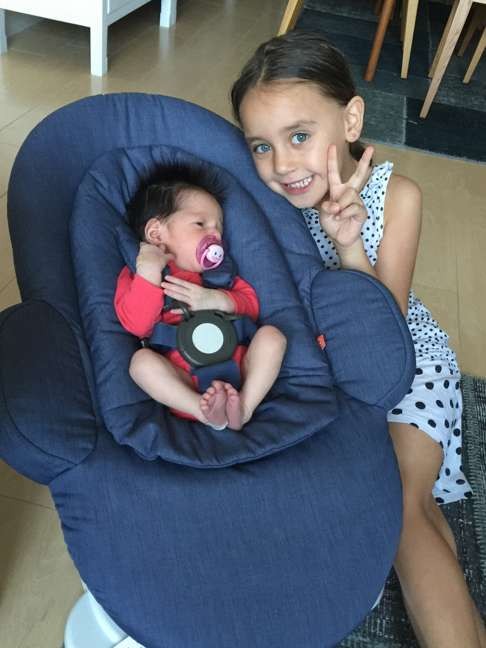Hong Kong health officials probe bacterial infections in babies born at private hospital
Centre for Health Protection investigates ‘cluster’ of Staphylococcus aureus infections, which can be deadly, in babies newly discharged from Matilda hospital, and puts it under surveillance
Friday, 27 May, 2016
The Centre for Health Protection is investigating a “cluster” of potentially lethal bacterial infections at Matilda International Hospital on The Peak that affected five babies born there this month.
The Department of Health said it had visited the private hospital and advised it to take relevant infection control measures.
A spokesman said: “The hospital has been put under medical surveillance. Epidemiological investigations are ongoing.”
The complaint that sparked the investigation was made by the parents of a girl born on May 7 at the Matilda who, they say, was discharged as healthy in spite of having pustules around her umbilical stump.
Lulu Violet de Kretser-Newell was eventually diagnosed with Staphylococcus aureus infection in her bloodstream, a potentially fatal condition, at Hong Kong Adventist Hospital on May 14.
She recovered after a week on intravenous antibiotics. The Post understands the other babies who were infected are also now well.
Lulu’s parents, Martin Newell and Ayesha de Kretser, worried that other patients, including newborn babies, at the Matilda could have been exposed to the bacteria, called the hospital to notify them of Lulu’s infection. But the Matilda’s deputy general manager Rajwinder Kaur “flatly denied they had any bacterial infections in the hospital”, de Kretser said. So she wrote to the department.
Based on the latest information provided by the Matilda, the babies were well upon discharge and were diagnosed [with a Staphylococcus aureus] infection on subsequent follow-up
“Based on the latest information provided by the Matilda, the babies were well upon discharge and were diagnosed [with a Staphylococcus aureus] infection on subsequent follow-up with their paediatricians in the community,” the department’s spokesman said.
He said the department would assess whether the Matilda had broken any law or failed to follow the code of practice covering private hospitals.
Lulu’s case created a stir on social media after de Kretser shared details of Lulu’s case on popular Facebook group Hong Kong Moms. Five more women contacted de Kretser via Facebook to say their babies, delivered around the same time as Lulu at the Matilda, had the same infection. The government’s investigation involves babies – three girls and two boys – born between May 3 and 7.
We feel that we must set the record straight in order to allay the understandable concerns our patients may have
Lulu was delivered by Dr Lucy Lord, of Central Health Medical Practice in Duddell Street, Central, and was seen by three of its paediatricians. Earlier on Friday the practice e-mailed all its patients a letter detailing Lulu’s case and referring to Facebook posts and the Post’s reports about the mothers’ claims.
“Understandably these reports have led to anxiety and confusion amongst our patients ... we feel that we must set the record straight in order to allay the understandable concerns our patients may have about admissions by Central Health to the Matilda Hospital after having read these posts and reports,” the e-mail said.

After a detailed account of the events since Lulu’s birth - parts of which de Kretser and Newell dispute - the Central Health doctors signed off: “We would also like to reassure all expectant mothers that our obstetricians ... consider the Matilda the hospital least likely to pass on a hospital-acquired infection to a newborn.
“The hospital rarely admits patients who are seriously ill, immune compromised, or debilitated. It also has no high-risk departments, no radiotherapy, no chemotherapy or [intensive care unit]. It is in fact a small hospital ideally suited to maternity care.”
Staphylococcus aureus, commonly referred to as “Staph”, is a bacteria carried in the noses or on the skin of about 30 per cent of healthy people. Occasionally Staph can get into the body and cause infection, ranging from minor (such as pimples, boils and other skin conditions) to serious (such as pneumonia).
Methicillin is a class of antibiotics commonly used to treat Staph infections, though some Staph bacteria have developed resistance to methicillin. Resistant bacteria are called methicillin-resistant Staphylococcus aureus (MRSA); bacteria that can be treat by methicillin are methicillin-sensitive Staphylococcus aureus. It was the latter with which the five newborns were diagnosed.

The health department spokesman said there was no statutory requirement for hospitals to notify it of a Staphylococcus aureus infection. However, he said, the Centre for Health Protection “encourages institutions and schools, including private hospitals, to report any suspected ... outbreaks of infectious diseases for investigation and recommendation on appropriate prevention and control measures”.
According to infectious diseases expert Dr Ho Pak-leung, an associate professor in the University of Hong Kong’s department of microbiology, Staph infections are sporadic in Hong Kong. In the past 10 years there have been outbreaks in a private hospital in Kowloon and at least three public hospitals.
“Staph is commonly carried by healthy adults in the nose, so usually the source of a newborn’s infection would be an adult,” he said.
No comments:
Post a Comment
Comments always welcome!